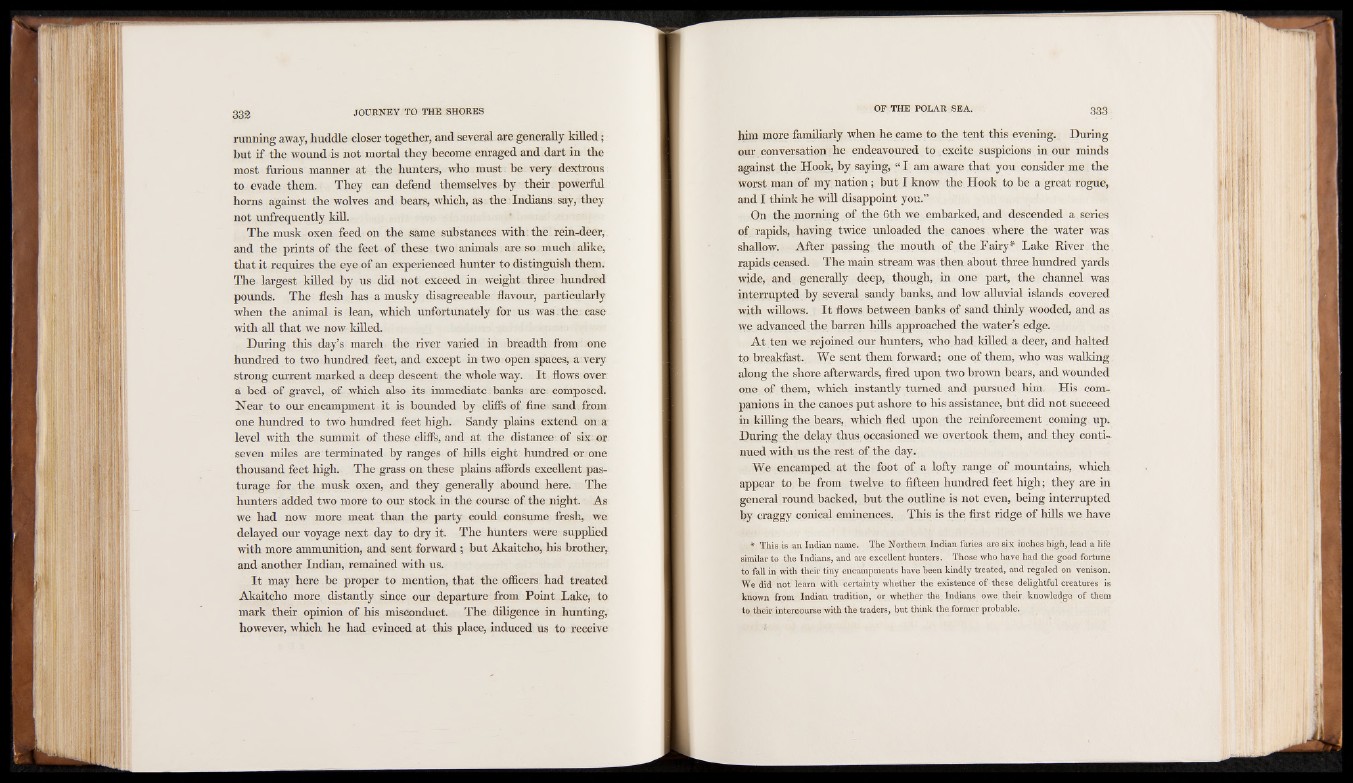
running away, huddle closer together, and several are generally killed;
but if the wound is not mortal they become enraged and dart in the
most furious manner at the hunters, who must : be very dextrous
to evade them. They can defend themselves by their powerful
horns against the wolves and bears, which, as the Indians say, they
not unfrequently kill.
The musk oxen feed on the same substances with the rein-deer,
and the prints of the feet of these two animals are so: much alike,
that it requires the eye of an experienced hunter to distinguish them.
The largest killed by us did not exceed in weight, three hundred
pounds. The flesh has a musky disagreeable flavour, particularly
when the animal is lean, which unfortunately for us was the, case
with all that we now killed.
During this day’s march the river varied in breadth from one
hundred to two hundred feet, and except in two open spaces, a. very
strong current marked a deep descent the -whole way. It flows over
a bed of gravel, of which also its immediate banks are: composed.
Near to our encampment it is bounded by cliffs of fine sand , from
one hundred to two hundred feet high. Sandy plains extend on; a
level with the summit of these cliffs, and at the distance of six: or
seven miles are terminated by ranges of hills eight hundred or one
thousand feet high. The grass on these plains affords excellent pasturage
for the musk oxen, and they generally abound here. The
hunters added two more to our stock in the course of the night. As
we had now more meat than the party could consume fresh, we
delayed our voyage next day to dry it. The hunters were supplied
with more ammunition, and sent forward ; but Akaitcho, his brother,
and another Indian, remained with us.
It may here be proper to mention, that the officers had treated
Akaitcho more distantly since our departure from Point Lake, to
mark their opinion of his misconduct. The diligence in hunting,
however, which he had evinced at this place, induced us to receive
him more familiarly when he came to the tent this evening. During
our conversation he endeavoured to excite suspicions in our minds
against the Hook, by saying, “I am aware that you consider me the
worst man of my nation; but I know the Hook to be a great rogue,
and I think he will disappoint you.”
On the morning of the 6th we embarked, and descended a series
of rapids, having twice unloaded the canoes , where the water was
shallow. After passing, the mouth of the Fairy* Lake River the
rapids ceased. The main stream was then about three hundred yards
wide, and generally deep, though, in one part, the channel was
interrupted by several sandy banks, and low alluvial islands covered
with willows. It flows between banks of sand thinly wooded, and as
we advanced the barren hills approached the water’s edge.
At ten we rejoined our hunters, who had killed a deer, and halted
to breakfast. We sent them forward; one of them, who was walking
along the shore afterwards, fired upon two brown bears, and wounded
one of them, which instantly turned and pursued him. His companions
in the canoes put ashore to his assistance, but did not succeed
in killing the bears, which fled upon the reinforcement coming up.
During the delay thus occasioned we overtook them, and they continued
with us the rest of the day.
We encamped at the foot of a lofty range of mountains, which
appear to be from twelve to fifteen hundred feet high; they are in
general round backed, but the outline is not even, being interrupted
by craggy conical eminences. This is the first ridge of hills we have
* This is an Indian name. The Northern. Indian faries are six inches high, lead a life
similar to the Indians, and are excellent hunters. Those who have had the good fortune
to fall in with their tiny encampments have been kindly treated, and regaled on venison.
We did not learn with certainty whether the existence of these delightful creatures is
known from Indian tradition, or whether the Indians owe their knowledge of them
to their intercourse with the traders, but think the former probable.